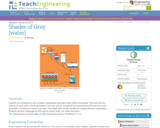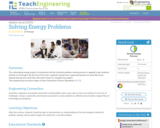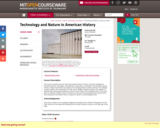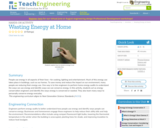27 Results

By the end of this section, you will be able to:Discuss Freud’s theory of psychosexual developmentDescribe the major tasks of child and adult psychosocial development according to EriksonDiscuss Piaget’s view of cognitive development and apply the stages to understanding childhood cognitionDescribe Kohlberg’s theory of moral development
- Subject:
- Psychology
- Social Science
- Material Type:
- Module
- Author:
- OpenStax College
- Date Added:
- 07/18/2021

Students are introduced to the concepts of graywater and water reuse within households. They calculate the amount of used water a family generates in one day and use a model of home plumbing to find out how much graywater is produced in homes every day. They graph their results and discuss energy efficiency implications. Students are then challenged to find ways to reduce water use within the home.
- Subject:
- Applied Science
- Architecture and Design
- Engineering
- Material Type:
- Activity/Lab
- Provider:
- TeachEngineering
- Provider Set:
- TeachEngineering
- Author:
- Katie Spahr
- Malinda Schaefer Zarske
- Date Added:
- 09/18/2014

The culminating energy project is introduced and the technical problem solving process is applied to get students started on the project. By the end of the class, students should have a good perspective on what they have already learned and what they still need to learn to complete the project.
- Subject:
- Applied Science
- Engineering
- Physical Science
- Physics
- Material Type:
- Activity/Lab
- Provider:
- TeachEngineering
- Provider Set:
- TeachEngineering
- Author:
- Jan DeWaters
- Susan Powers
- Date Added:
- 09/18/2014

In this activity, students act as engineers to determine which type of insulation would conserve the most energy.
- Subject:
- Applied Science
- Architecture and Design
- Engineering
- Material Type:
- Activity/Lab
- Lesson Plan
- Provider:
- TeachEngineering
- Provider Set:
- TeachEngineering
- Author:
- Denise Carlson
- Malinda Schaefer Zarske
- Natalie Mach
- Sharon D. Perez-Suarez
- Date Added:
- 09/18/2014

Subject considers how the visual and material world of "nature" has been reshaped by industrial practices, beliefs, structures, and activities. Readings in historical geography, aesthetics, American history, environmental and ecological history, architecture, city planning, and landscape studies. Several field trips planned to visit local industrial landscapes. Assignments involve weekly short, written responses to the readings, and discussion-leading. Final project is a photo-essay on the student's choice of industrial site (photographic experience not necessary).
- Subject:
- History
- U.S. History
- Material Type:
- Full Course
- Provider:
- M.I.T.
- Provider Set:
- M.I.T. OpenCourseWare
- Author:
- Pietruska, Jamie
- Date Added:
- 01/01/2008

People use energy in all aspects of their lives for cooking, lighting and entertainment. Much of this energy use takes place in buildings, such as our homes. To save money and reduce the impact on our environment, many people are reducing their energy use. One way is to hire engineers to perform home energy audits to understand the ways we use energy and identify ways we can conserve energy. In this activity, students act as energy conservation engineers and identify the ways energy is conserved or wasted. They also learn many ways to personally conserve energy everyday.
- Subject:
- Applied Science
- Engineering
- Environmental Science
- Material Type:
- Activity/Lab
- Provider:
- TeachEngineering
- Provider Set:
- TeachEngineering
- Author:
- Denise Carlson
- Malinda Schaefer Zarske
- Natalie Mach
- Sharon D. Perez-Suarez
- Date Added:
- 10/14/2015
